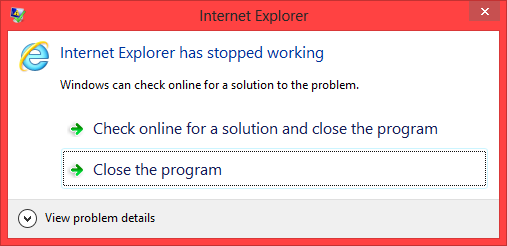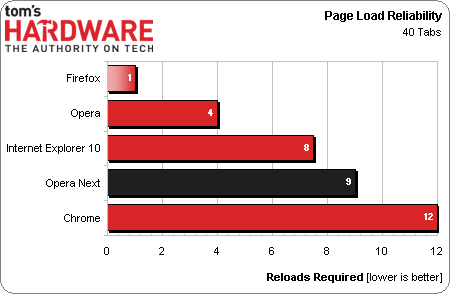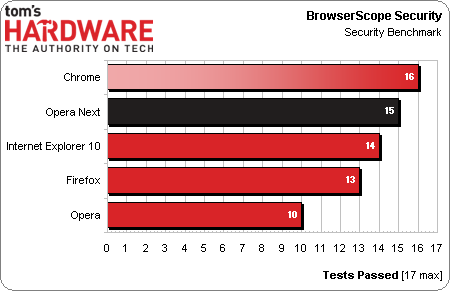Chrome 27, Firefox 22, IE10, And Opera Next, Benchmarked
Today, we have the latest benchmark results from the top four Windows-based Web browsers, along with a sneak peek at Opera's upcoming Chromium-based overhaul. Is this really a step-up from Presto/Carakan or just another Chrome clone?
Reliability And Security
Why you can trust Tom's Hardware
Reliability
During our three-phase memory testing, we have the opportunity to see not only how much memory a browser uses, but also how it behaves under heavy load. After launching the additional 39 pages, we have to check each tab to ensure that all 40 of them are fully and properly rendered. After all, blank pages lower a browser's memory usage total. So, we record each time that we have to reload a tab due to broken formatting or missing elements. Thus, the browser with the lowest number of reloads displays the highest number of pages properly.
While the 40 test pages are recorded cached and hot, naturally, we first had to load them uncached and cold. During this setup process, IE10 crashes and must re-open and reload all 40 tabs.
Although this isn't something we tested for specifically, we must make note of this behavior. No other browser since Safari 4.x (Windows version) has crashed under these conditions.
Somewhat surprisingly, Firefox 22 takes the lead over Opera 12 in this metric with just a single necessary reload. Again, that's a marked improvement over previous rapid-release versions. Opera 12 requires an average of four reloads to earn a relatively distant second place. IE10 places third, with twice the number of reloads, followed by Opera Next with nine. Chrome takes last place with more than a quarter of the test pages requiring a refresh.
This is one metric where Opera Next loses to the current version. Although it's just as fast as Opera 12, Opera Next is half as reliable. This is an attribute Opera's fans typically value, so it'll need to be addressed.
Security
BrowserScope's Security test remains our sole benchmark in this area. This test is more of a checklist, like the standards conformance tests, than an actual performance benchmark.
Chrome still holds the top spot in this test with 16 out of 17 tests passed. Opera Next takes second place, passing 15 of the security checkpoints. IE10 is in third place with a score of 14, followed by Firefox in fourth place with 13 tests passed. Opera 12 again comes up short, passing just 10 of the 17 security checks.
At least right now, Opera Next represents a more secure option than the browser's current version. However, there is always security in obscurity, and Chromium surely presents a much more attractive target for exploits than Opera 12, which no one even attempted to hack at this year's two major hacking competitions. So, only time can tell whether the move to Chromium is actually an upgrade in this respect.
Get Tom's Hardware's best news and in-depth reviews, straight to your inbox.
-
Onus No, the Onus is not on Google; I'm using www.startpage.com for my searches.Reply
While this is interesting, I still encounter built-in pages (such as on routers or other network devices) that will not render cleanly in Firefox, but are perfect in IE. More often than not though, pages that would be filled with nuisance ads and popups are cleaned up nicely by Firefox with AdBlock+ and NoScript.
-
soundping A good test is rendering a heavy site like Huffington Post. They use a ton of flash and java scripts.Reply -
ivyanev While benchmarks are the way to compare browsers, they do not represent the feel you get- firefox might be faster but still feels sluggish compared to chrome or opera(the stable one).Reply -
pharoahhalfdead I would like to see benchmarks on page start up, and load times comparing ssd, hard drives, and ram drives. Maybe I missed these an a previous article, but I feel since ssd's and ram drives are getting more popular, benchmarks should prove or dispel the the 'so called' benefits they bring.Reply
I have both and start up times for IE are quick but page load times are horrendously slow, whereas FF has slow start up times but superfast page load times. It's possible that add-ons are contributing to that. -
mccainm Ever since I have compared Firefox and Chrome I've always found Chrome to start much faster (I'm running the Dev channel and my wife uses the Stable channel and they both take maybe 1 - 2 seconds to start cold or hot). Only IE beats both of them. Maybe Firefox 22 is that much faster and worth a try, but seeing as Chrome did so well in most categories I'll probably stick with it.Reply -
EzioAs Having move back to Firefox a couple years ago after Chrome, I don't intend to use Chrome (or any other browser) regularly anymore. I still give Chrome 2-3 tries a week (just to compare things) but Chrome isn't better than FF in 3 things:Reply
1) Pages load noticeably slower
2) Memory usage is indeed high (as seen in the benchmark above)
3) FF add-ons are much better than chrome extensions.
I never noticed any startup time difference for both FF and Chrome; it's possible they're both fast enough that it doesn't even matter at this point. I also like the FF toolbars better although that's really more of a personal preference. I've never tried maxthon though; heard it's pretty good. -
beoza I've never really noticed a difference in browsers speed wise. Sure some load pages faster than others, and some have issues with certain pages. But in the end they all take me to the same place. I use Firefox 95% of the time at home with adblock+, if I encounter an issue I clear cache, if it still has issues I switch to IE 10, usually this is all I need to do but once in a while IE has problems with a page and I just move on to something else. At work I'm stuck using IE10. The speed of a browser can also be affected by other factors like the speed of your connection, how many devices are on your network, what tasks your doing on the computer at the same time like gaming, downloading, streaming movies (netflix, hulu), and your hardware. You're not going to get much responsiveness on a 5yr old celeron w/2gb ram and Win XP while you're downloading a game, watching youtube and the A/V suite scans your computer in the background, and there's 5 other people all sharing your 10Mbps network. Which describes probably 50% of the users out there in the real world.Reply -
Someone Somewhere Opera Next (and every other browser) is a significant step down in terms of features/customization from the current version.Reply
I'll miss a hell of a lot of stuff when I move off Presto-based Opera. -
ElDani Well done on this test, I actually found the test results genuinely helpful and your summary/conclusion to be well thought out.Reply
Still, this test shows us once more, that no modern browser - I exclude Opera from this, since it isn't a maintained release anymore - must absolutely be replaced by the winner of such tests. If you don't mind performance weaknesses of the Internet Explorer in certain areas, or if your most-accessed websites don't require you to use a certain alternative, then even Microsoft's browser of choice can be okay for daily use (if only as an engine in products like Avant, Maxthon, etc).
The one thing I'm a bit curious about: why does Opera Next suddenly behave so differently from Chrome? Yes, there's a difference between Chrome 27 (WebKit) and Opera Next (Blink = Chrome 28), but if that's the only reason for the browser's weaker showing, then the future of Chrome doesn't look too good. What's your take on this? -
tomfreak I dont know how useful in this review when they are tested all the browser on a 1155 super computer, nobody is going to tell the diff if the browser is 0.25sec faster. Get some Brazos, Atom and run the test, these are the platform have problems with web browsing.Reply


